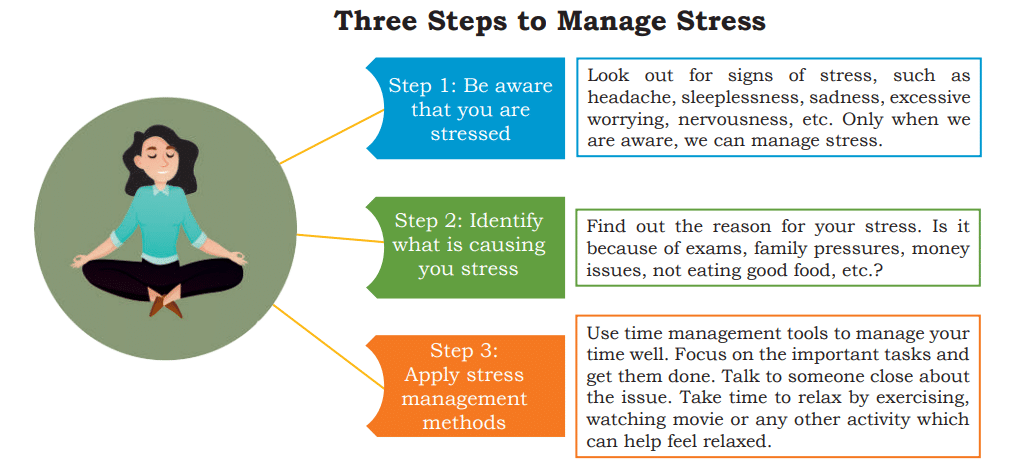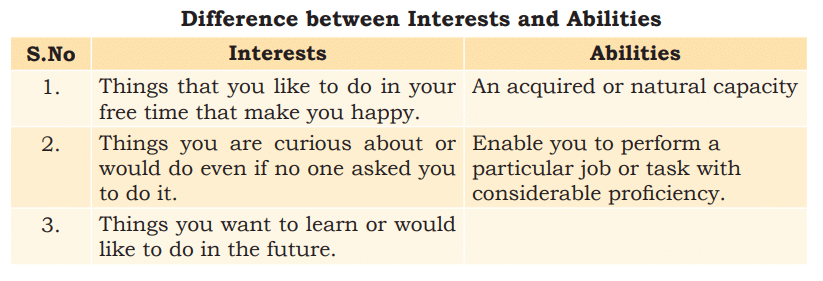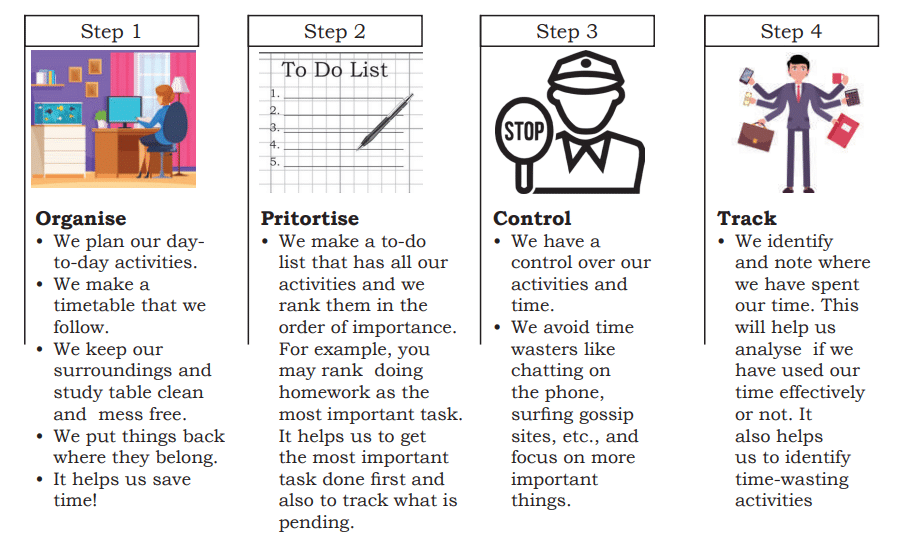Teachers and Examiners collaborated to create the Self Management Skills Class 10 Notes. All the important Information are taken from the NCERT Textbook Employability Skills Class X Based on CBSE Board Pattern.
Self Management Skills Class 10 Notes
Self management is about effectively handling emotions, thoughts, and actions. It includes stress management, self motivation, work independently, career path and goal-setting. Strong self management skills empower individuals to excel in specific areas, outperforming others.
Following are some of the skills you must master to succeed in life –
- Self-awareness – Ask for honest opinions about yourself. Reflect on how you handle situations at work and in daily interactions. Learn and improve.
- Responsibility – Taking responsibility of your tasks is important for personal growth. If assigned a task, take full responsibility. If there are delays, admit it, rectify, and learn.
- Time Management – Priorities the things you have to do. reduce unnecessary word, create a schedule, and make a time table and follow it diligently.
- Adaptability – Stay updated on best practices, continuously learn new information, and be ready for changes to transition smoothly.
Session 1: Stress Management

What is Stress?
Stress can be defined as our emotional, mental, physical and social reaction to any perceived demands or threats. These demands or threats are called stressors. Stressors are Stress the reason for stress.
For example,
- Feeling unprepared for upcoming exams.
- Experiencing with the loss of a close family member.
- Worried about people’s opinions on appearance and confidence.
- Stressed due to insufficient sleep.
What is Stress Management?
Dealing with stress means figuring out a good way to handle the everyday pressures in your life. The main aim is to find a balance between your job, relationships, time to relaxation, and having fun. This involves making a plan so you can tackle daily stressors and face challenges with a positive attitude.
Always keep in mind the ABC of stress management
A: Adversity or the stressful event
B: Beliefs or the way you respond to the event
C: Consequences or actions and outcomes of the event

Management Techniques
Here are a few simple stress management techniques.
- Time Management: Plan your time effectively to reduce stress.
- Exercise and Fresh Air: Stay active with activities like yoga or a simple walk for better blood circulation and relaxation.
- Healthy Diet: Eat a balanced diet with items like dal, roti, vegetables, and fruits for energy and efficiency.
- Positivity: Focus on the positive aspects of life instead of dwelling on the negative. Stay optimistic, even when facing challenges.
- Adequate Sleep: Ensure at least 7 hours of sleep for a refreshed mind and body.
- Family and Friends Time: Take breaks with loved ones during holidays to break from routine and return with a fresh perspective.
Ability to Work Independently
If you can become a calm and relaxed person, you will be have the ability to work independently, which means.
- becoming self-aware, self-monitoring and self-correcting.
- knowing what you need to do.
- taking the initiative rather than being told what to do.
- recognizing your mistakes and not blaming others.
- having the ability and the will to learn continuously.
Emotional Intelligence
Emotional intelligence involves understanding and handling both your own emotions and the feelings of others. This usually includes three key skills –
- Emotional Awareness: Recognizing and identifying your own emotions.
- Harnessing Emotions: Using emotions to enhance thinking and problem-solving.
- Managing Emotions: Regulating your own emotions when needed and assisting others in doing the same.
Some steps to manage emotional intelligence are as given below –
- Understand your emotions: Observe how you act and identify areas for improvement. Work on those areas to enhance yourself.
- Rationalize: Avoid impulsive decisions; instead, think logically and make rational choices.
- Practices: Practice meditation and yoga for a calm and composed state of mind.
Session 2: Self-awareness— Strength and Weakness Analysis
Techniques for Identifying your Strengths and Weaknesses
Finding Strengths (or abilities)
- Identify areas where you consistently succeed.
- Consider what others appreciate about you.
- Take time to recognize and acknowledge your own strengths and abilities.
Finding Weaknesses
- Recognize areas where you face challenges or find tasks difficult.
- Pay attention to what others commonly say about your performance.
- Be open to feedback, accepting weaknesses as opportunities for growth rather than a source of discouragement.
Difference between Interests and Abilities (Strengths)

Session 3: Self-motivation
Self-motivation is the internal drive that compels us to take action, achieve goals, and enhance our well-being independently, without external influence. In other words, it is our ability to do the things that need to be done without someone or something influencing us.
Types of Motivation
There are two type of motivation –
- Internal Motivation: Comes from personal satisfaction, passion or a sense of purpose within oneself. It’s driven by an individuals own values and interests.
- External Motivation: Originates from external factors such as rewards or recognition from others. It involves being influenced by outside sources to take action or achieve a goal.

Qualities of Self-motivated People
There are some typical behaviors seen in self-motivated people which are as given below.

Building Self-motivation
- Find out your strengths
- Set and focus on your goals
- Develop a plan to achieve your goals
- Stay loyal to your goals
Session 4: Self-regulation— Goal Setting
Goals and Setting
Goals : They are a set of dreams with a deadline to get them, for example, saving pocket money to buy a favorites mobile phone by a particular date.
Goal setting : It is all about finding and listing your goals and then planning on how to achieve them.
How to set SMART Goals
SMART stands for Specific, Measurable, Achievable, Realistic and Time bound.
1) Specific
A specific goal addresses six key questions:
- Who is involved?
- What do I want to achieve?
- Where do I begin?
- When do I start and finish?
- Which means do I use?
- Why am I pursuing this?
Non-specific goal
- I want to learn English.
Specific goal
- I aim to speak English fluently by attending coaching classes after school daily.
- In six months, I’ll participate in the inter-school debate competition.
2) Measurable
A measurable goal answers the questions
- How much?
- How many?
- How do I know that I have achieved results?
Not measurable goal:
- I want to be rich.
Measurable goal:
- I want to have 5 times more money than what I have today in my hand at the end of this year.
3) Achievable
Breaking down big goals into smaller parts will make the goal achievable.
Bigger Goal
- I want to become a teacher in my school.
Breaking it into smaller goals:
- Complete higher secondary
- Complete Graduation
- Complete B.Ed.
- Apply for jobs in the teaching field
4) Realistic
A realistic goal would be something that we want to achieve and can work towards.
Example of unrealistic goal
- I will read my entire year’s syllabus in one day and get good marks.
Realistic goal
- I spend 3 hours every day of the year after school to revise my subjects to get good marks in the exams.
5) Time bound
A SMART goal should have a timeframe by when the goal needs to be achieved. This encourages us to take actions to completely fulfill the goals.
Not a time bound goal
- I want to lose 10 kg someday.
Time bound goal
- I want to lose 10kg in the next 6 months.
Session 5: Self-regulation— Time Management
Time Management and Its Importance
Time management is important because it helps you use your time effectively, ensuring that you accomplish tasks efficiently, reduce stress, and make room for things you enjoy. It’s about prioritizing activities, staying organized, and achieving a better balance in your life.
Time management is the thinking skill that helps you to
- Complete your tasks on time.
- Make a timetable.
- Make a good guess how long tasks will take.
- Submit homework and assignments on time.
- Not waste time during the day.
Four Steps for Effective Time Management
- Organize: Arrange our daily tasks systematically.
- Prioritize: Create a to-do list and rank tasks by importance.
- Control: Manage activities and time effectively.
- Track: Identify and record how time is spent.

Tips for Practicing the Four Steps for Effective Time Management
- Avoid delay or postponing any planned activity
- Organize your room and school desk
- Develop a ‘NO DISTURBANCE ZONE’, where you can sit and complete important tasks
- Use waiting time productively
- Prepare a ‘To-do’ list
- Prioritise
- Replace useless activities with productive activities
Stress Management
What is Stress?
Stress is a strain or tension that might be either physical, mental or emotional. Stress can have a negative impact on physical and mental health and can come from a different situations, including employment, relationships, and financial difficulties.
Employability Skills Class 10 Notes FAQ
Q. Why is it important to manage stress class 10?
Managing stress is important for good health, better school performance, and overall well-being.
Q. What are self-management skills class 10?
These are abilities like organizing time, setting goals, and handling stress, helping students become responsible and independent.
Q. What is stress Class 10 402?
Stress is our emotional, mental, physical and social reaction to any perceived demands or threats. These demands or threats are called stressors. Stressors are the reason stress. For example, you are too close to the exams but feel unprepared.
Q. What is self skill management?
It’s about controlling your actions and emotions while developing skills for personal growth and success. Important for achieving goals and a balanced life.
Q. Self management skills class 10 pdf
Self management skills class 10 pdf you can download from the cbseskilleducation.com website, the topic related to self management skills as per the CBSE syllabus it given point wise and easy to understand.
Q. Self management skills class 10 notes questions and answers pdf
Yes you can download notes, questions and answers pdf from the given link, All questions are important.
Q. Self management skills class 10 notes questions and answers
Yes you can read notes, questions and answers from the given link, All questions are important.
Q. Self management skills class 10 notes mcq
Yes, MCQ is also available in the website, please refer the below link.
Q. Self-management skills class 10 solutions
All the CBSE and some extra solutions are given in the website, please refer the below link.
Q. Self management skills class 10 CBSE
It’s about controlling your actions and emotions while developing skills for personal growth and success. Important for achieving goals and a balanced life.
Q. Self management skills class 10 important questions and answers
You can read the questions and answers from the below link.
Q. Unit 2: self management skills class 10 questions and answers
You can read the questions and answers from the below link.
